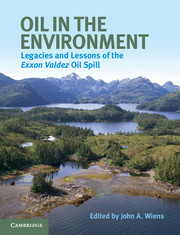Part V - Conclusions
Published online by Cambridge University Press: 05 July 2013
Summary
Introduction
When all is said and done, what is the legacy of the Exxon Valdez oil spill? The hundreds of scientific studies, many of which are discussed in the chapters of this book, enriched our knowledge of Prince William Sound (PWS) and its ecosystems and of how the elements of these ecosystems responded to oil in the environment. In the process, they also revealed much about the challenges of conducting high-level science in a harsh and variable environment. In this concluding chapter, John Wiens reviews the broad themes that have emerged from these studies, which provide cogent lessons for those who must grapple with assessing the consequences of other large environmental disruptions, whether caused by human accidents such as oil spills or by natural processes such as floods or forest fires.
The Exxon Valdez oil spill did more than unleash oil into PWS. It also spawned litigation that lasted for more than two decades, fueling competing agendas and controversy. These factors created the additional challenge of separating science from underlying agendas or preconceptions about spill effects. The quality of the studies summarized in this book testifies that it can be done, although it was not always easy.
- Type
- Chapter
- Information
- Oil in the EnvironmentLegacies and Lessons of the Exxon Valdez Oil Spill, pp. 420 - 422Publisher: Cambridge University PressPrint publication year: 2013



